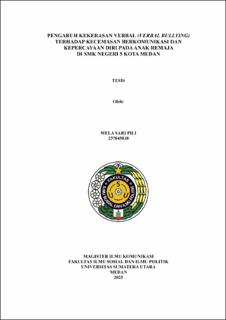| dc.description.abstract | This study aims to analyze the influence of verbal bullying on communication anxiety and self-confidence among adolescents at SMK Negeri 5 in Medan City. The research uses a quantitative method based on Albert Bandura's cognitive-behavioral theory. The sample consists of 266 respondents selected using stratified random sampling from a total population of 794 students, including those in grade X and XI. Data collection was conducted through questionnaires, and data analysis involved univariate tables. cross-tabulation analysis, and hypothesis testing using Spearman Rho. The results show that verbal bullying significantly affects communication anxiety, contributing 33% (r=0.578), which falls under the moderate influence category. This finding indicates that the higher the level of verbal bullying experienced, the higher the level of communication anxiety among students at SMKN 5 Medan. Poor communication can negatively impact social interaction, reduce communication quality, and hinder adaptability. Moreover, verbal bullying also significantly impacts self-confidence, with a moderate influence of 26% (r=0.510), meaning that increased exposure to verbal bullying correlates with lower self-confidence. This implies difficulties in personal growth, reluctance to express oneself, persistent feelings of shame, and a negative self-perception. Simultaneously, the combined effect is 32% (r=0.570), indicating that adolescents who experience higher levels of verbal bullying tend to have greater communication anxiety and lower self-confidence. This underscores the critical role of verbal bullying in influencing adolescents' psychosocial aspects, particularly their communication abilities and the development of self-confidence within the school environment. | en_US |


